人教新目标(Go for it)版 七年级上 Unit 6 Do you like bananas? Section B 2a-2c 课件 (共23张PPT)
文档属性
| 名称 | 人教新目标(Go for it)版 七年级上 Unit 6 Do you like bananas? Section B 2a-2c 课件 (共23张PPT) | 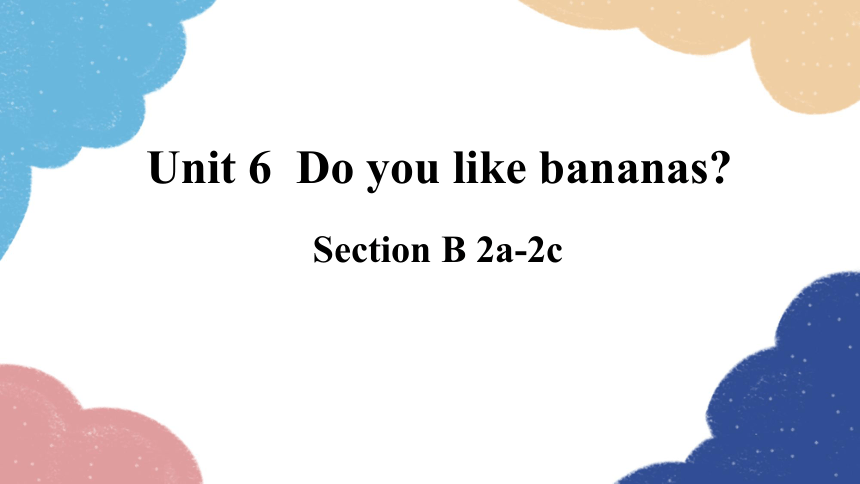 | |
| 格式 | pptx | ||
| 文件大小 | 5.1MB | ||
| 资源类型 | 教案 | ||
| 版本资源 | 人教新目标(Go for it)版 | ||
| 科目 | 英语 | ||
| 更新时间 | 2022-07-14 13:24:35 | ||
图片预览

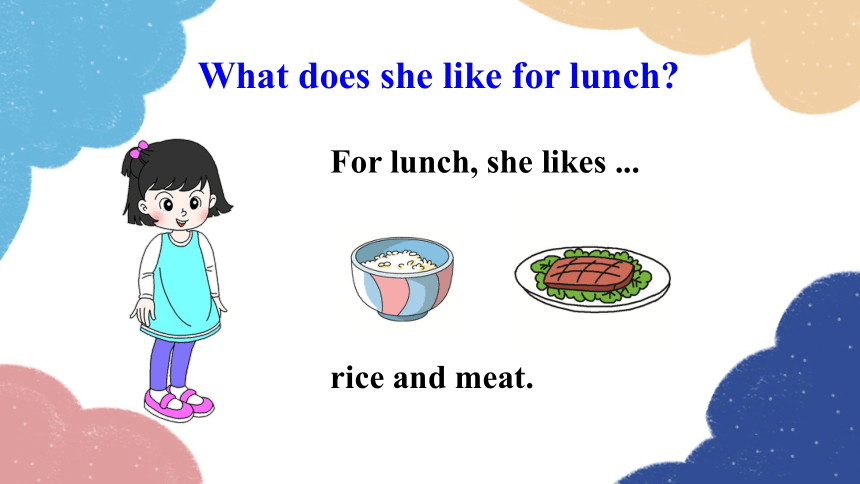
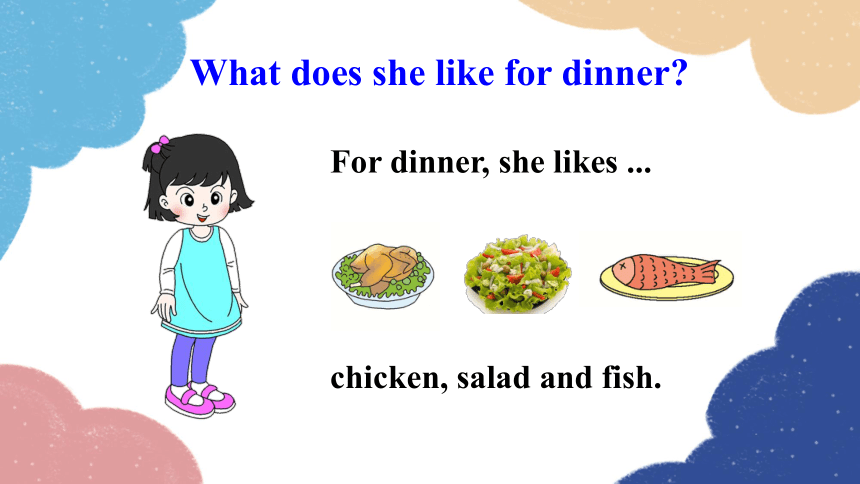
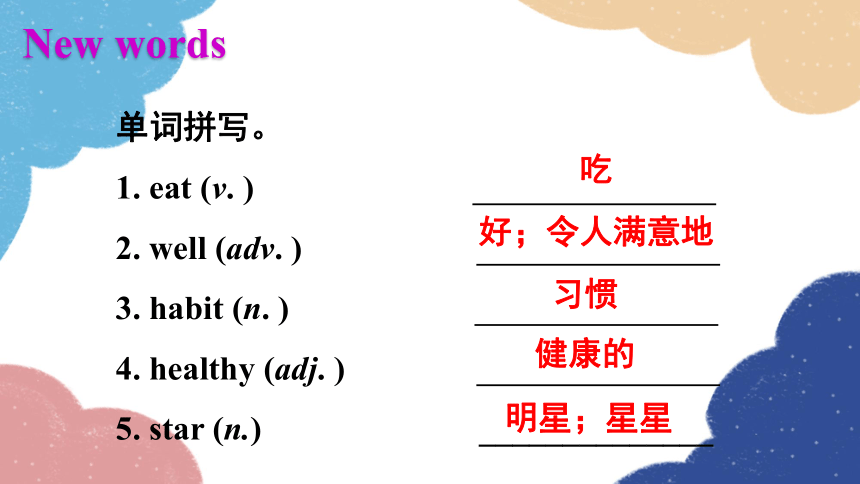
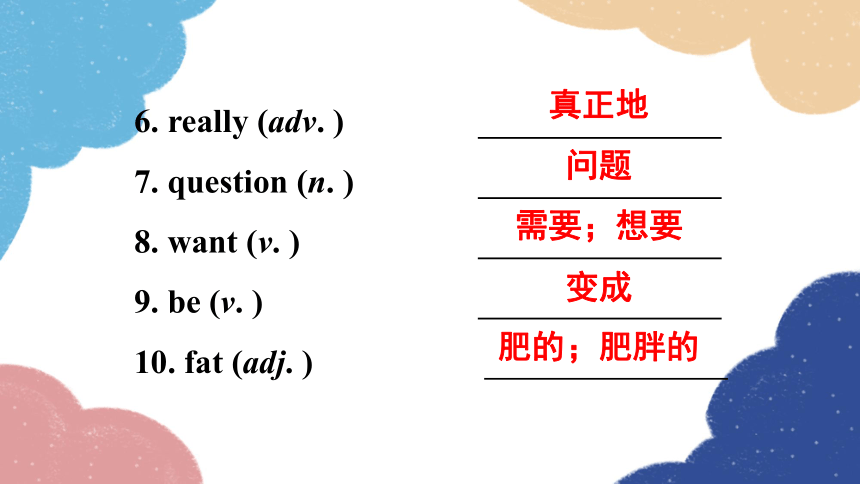
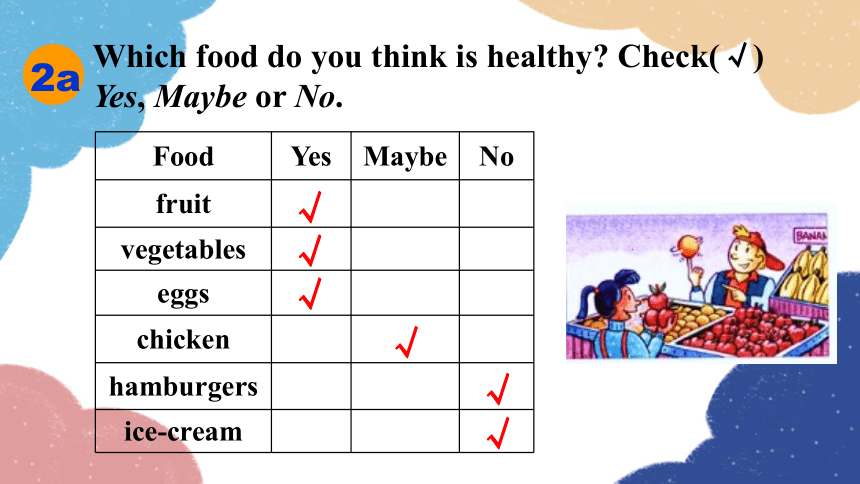
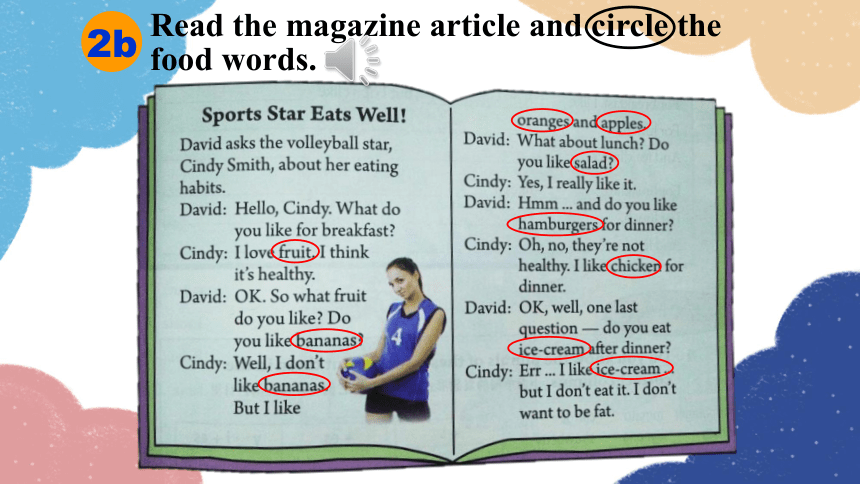
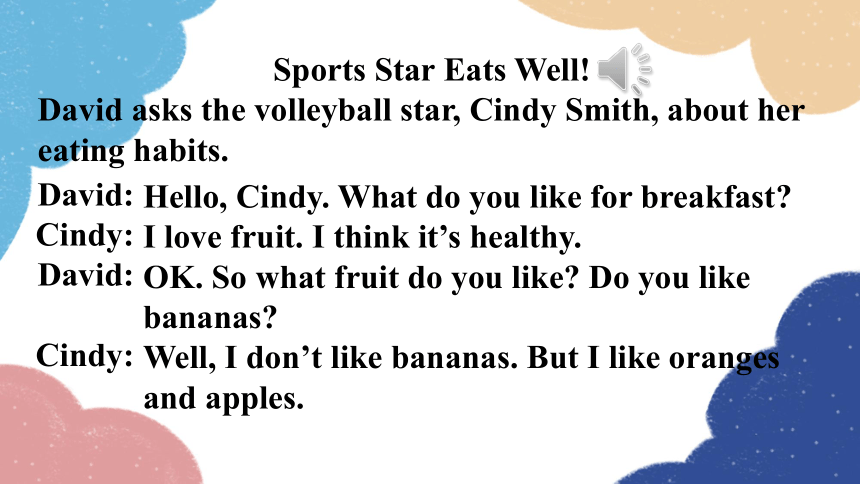
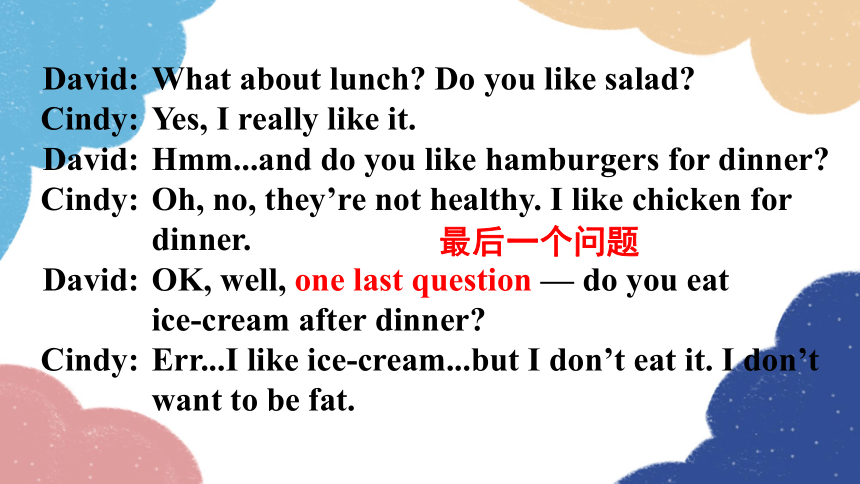
文档简介
(共23张PPT)
Unit 6 Do you like bananas
Section B 2a-2c
What does she like for lunch
For lunch, she likes ...
rice and meat.
What does she like for dinner
For dinner, she likes ...
chicken, salad and fish.
New words
单词拼写。
1. eat (v. )
2. well (adv. )
3. habit (n. )
4. healthy (adj. )
5. star (n.) ______________
吃
好;令人满意地
习惯
健康的
明星;星星
6. really (adv. )
7. question (n. )
8. want (v. )
9. be (v. )
10. fat (adj. )
真正地
问题
需要;想要
变成
肥的;肥胖的
2a
Which food do you think is healthy Check(√) Yes, Maybe or No.
Food Yes Maybe No
fruit
vegetables
eggs
chicken
hamburgers
ice-cream
√
√
√
√
√
√
2b
Read the magazine article and circle the food words.
Sports Star Eats Well!
David asks the volleyball star, Cindy Smith, about her eating habits.
David:
Cindy:
David:
Cindy:
Hello, Cindy. What do you like for breakfast
I love fruit. I think it’s healthy.
OK. So what fruit do you like Do you like bananas
Well, I don’t like bananas. But I like oranges and apples.
What about lunch Do you like salad
Yes, I really like it.
Hmm...and do you like hamburgers for dinner
Oh, no, they’re not healthy. I like chicken for dinner.
OK, well, one last question — do you eat
ice-cream after dinner
Err...I like ice-cream...but I don’t eat it. I don’t want to be fat.
David:
Cindy:
David:
Cindy:
David:
Cindy:
最后一个问题
For breakfast, Cindy likes ______.
A. eggs B. bananas
C. oranges and apples
2. For lunch, She likes ______.
A. salad B. hamburgers
C. eggs D. tomatoes
3. For dinner, she has _______.
A. ice –cream B. hamburgers
C. carrots D. chicken
Listen and choose.
A
D
C
1. Cindy is a volleyball star.
2. She likes healthy food.
3. Cindy likes fruit for breakfast.
4. She likes bananas very much.
5. She doesn’t like ice cream.
6. She likes hamburgers for dinner.
7. She always eat ice-cream after dinner.
Read and tell “T” or “F”.
T
F
F
F
F
T
T
likes
doesn’t like bananas.
chicken
doesn’t
Write five sentences about Cindy’s eating habits.
2c
Cindy likes healthy food.
1. Cindy______________________
2. She _________________________
3. She _________________________
4. Cindy doesn’t _________________________
5. She doesn’t __________________________
loves fruit.
eat ice-cream after dinner.
likes oranges and apples.
likes salad for lunch.
like hamburgers for dinner.
Language points
good和well都有“好”之意, 但是good为形容词, 主要修饰名词, 在句中作定语或表语; 而well为副词, 主要修饰动词, 表示“做某事做得好”。
1. Sports Star Eats Well! 体育明星吃得好!
well 和 good
well
good
形容词, 一般指人的品质好或物品的质量好
作为形容词, 意为“健康的”, 放在连系动词后作表语; 作为副词, 意为“做某事做得好”, 修饰动词
Li Ming is a good boy. He is well. He plays volleyball well. 李明是一个好男孩。他身体健康。他排球打得好。
2. David asks the volleyball star, Cindy Smith, about
her eating habits.
ask sb. about sth.意为“问某人关于某事”。
Can I ask you a question about the soccer game
我能问你一个关于足球比赛的问题吗?
eating habits意为“饮食习惯”。
habit为可数名词,意为“习惯”。
He has a good eating habit.
他有一个很好的饮食习惯。
3.What do you like for breakfast 你早餐喜欢吃什么?
“What do/does主语+like for+某餐?” 用于询问某人某餐喜欢吃什么。
介词for与一日三餐名称搭配使用时,表示各餐喜欢吃的食物。
例:我午餐喜欢吃鱼。
I like fish for lunch.
4. I think it’s healthy. 我认为它是健康的。
例:我们必须保持健康。
We must keep healthy.
healthy为形容词, 意为“健康的”, 其名词形式为health, 意为“健康”。常用短语keep/stay healthy, 意为“保持健康”,相当于be in good health。
5. Yes, I really like it.是的,我确实喜欢它。
really作副词,意为“真正地,确实地”。
用于修饰形容词、副词或动词,表示程度。
really可用于口语中,表示感兴趣、怀疑、惊讶、疑问、恼怒或抗议。
—We will have 7 days’ holiday.
—Really
6. I don’t want to be fat. 我可不想变胖。
want to be … 意为“想要变得……;想要成为……”,动词 be 之后接形容词或名词。
*她不想成为一名教师。
She doesn’t want to be a teacher.
want 作及物动词,意为“需要;想要”。
(1) want sth. 想要某物
I want a map.我想要一张地图。
(2) want to do sth. 想做某事
The girl wants to go home.那女孩想回家。
(3) want sb.(not) to do sth. 想要某人(不)做某事
I want you to help me find my bag.
我想让你帮我找到包。
Ⅰ. 用所给词的适当形式填空。
1. Do you have a nice (eat) habit
2. Nobody (没有人) wants (be) fat, so we
don’t have hamburgers.
3. My parents like to eat (health) food.
4. Mr. Smith (not like) chicken or eggs.
5. I (real) like fruit and milk. I want to have
them every day.
eating
to be
healthy
doesn’t like
really
Exercise
Ⅱ. 单项选择。
1. We eat and we are all .
A. well; health B. well; healthy
C. good; health D. good; healthy
2. — do you like breakfast
—I love eggs and milk.
A. How; with B. How; for
C. What; for D. What; with
3. I want some apples and chicken this afternoon.
A. to have B. have
C. having D. to has
4. David chicken, but he fruit.
A. like; don’t like B. like; like
C. likes; doesn’t like D. likes; likes
5. I like hamburgers for lunch. What you, Linda
A. for B. about C. with D. of
Unit 6 Do you like bananas
Section B 2a-2c
What does she like for lunch
For lunch, she likes ...
rice and meat.
What does she like for dinner
For dinner, she likes ...
chicken, salad and fish.
New words
单词拼写。
1. eat (v. )
2. well (adv. )
3. habit (n. )
4. healthy (adj. )
5. star (n.) ______________
吃
好;令人满意地
习惯
健康的
明星;星星
6. really (adv. )
7. question (n. )
8. want (v. )
9. be (v. )
10. fat (adj. )
真正地
问题
需要;想要
变成
肥的;肥胖的
2a
Which food do you think is healthy Check(√) Yes, Maybe or No.
Food Yes Maybe No
fruit
vegetables
eggs
chicken
hamburgers
ice-cream
√
√
√
√
√
√
2b
Read the magazine article and circle the food words.
Sports Star Eats Well!
David asks the volleyball star, Cindy Smith, about her eating habits.
David:
Cindy:
David:
Cindy:
Hello, Cindy. What do you like for breakfast
I love fruit. I think it’s healthy.
OK. So what fruit do you like Do you like bananas
Well, I don’t like bananas. But I like oranges and apples.
What about lunch Do you like salad
Yes, I really like it.
Hmm...and do you like hamburgers for dinner
Oh, no, they’re not healthy. I like chicken for dinner.
OK, well, one last question — do you eat
ice-cream after dinner
Err...I like ice-cream...but I don’t eat it. I don’t want to be fat.
David:
Cindy:
David:
Cindy:
David:
Cindy:
最后一个问题
For breakfast, Cindy likes ______.
A. eggs B. bananas
C. oranges and apples
2. For lunch, She likes ______.
A. salad B. hamburgers
C. eggs D. tomatoes
3. For dinner, she has _______.
A. ice –cream B. hamburgers
C. carrots D. chicken
Listen and choose.
A
D
C
1. Cindy is a volleyball star.
2. She likes healthy food.
3. Cindy likes fruit for breakfast.
4. She likes bananas very much.
5. She doesn’t like ice cream.
6. She likes hamburgers for dinner.
7. She always eat ice-cream after dinner.
Read and tell “T” or “F”.
T
F
F
F
F
T
T
likes
doesn’t like bananas.
chicken
doesn’t
Write five sentences about Cindy’s eating habits.
2c
Cindy likes healthy food.
1. Cindy______________________
2. She _________________________
3. She _________________________
4. Cindy doesn’t _________________________
5. She doesn’t __________________________
loves fruit.
eat ice-cream after dinner.
likes oranges and apples.
likes salad for lunch.
like hamburgers for dinner.
Language points
good和well都有“好”之意, 但是good为形容词, 主要修饰名词, 在句中作定语或表语; 而well为副词, 主要修饰动词, 表示“做某事做得好”。
1. Sports Star Eats Well! 体育明星吃得好!
well 和 good
well
good
形容词, 一般指人的品质好或物品的质量好
作为形容词, 意为“健康的”, 放在连系动词后作表语; 作为副词, 意为“做某事做得好”, 修饰动词
Li Ming is a good boy. He is well. He plays volleyball well. 李明是一个好男孩。他身体健康。他排球打得好。
2. David asks the volleyball star, Cindy Smith, about
her eating habits.
ask sb. about sth.意为“问某人关于某事”。
Can I ask you a question about the soccer game
我能问你一个关于足球比赛的问题吗?
eating habits意为“饮食习惯”。
habit为可数名词,意为“习惯”。
He has a good eating habit.
他有一个很好的饮食习惯。
3.What do you like for breakfast 你早餐喜欢吃什么?
“What do/does主语+like for+某餐?” 用于询问某人某餐喜欢吃什么。
介词for与一日三餐名称搭配使用时,表示各餐喜欢吃的食物。
例:我午餐喜欢吃鱼。
I like fish for lunch.
4. I think it’s healthy. 我认为它是健康的。
例:我们必须保持健康。
We must keep healthy.
healthy为形容词, 意为“健康的”, 其名词形式为health, 意为“健康”。常用短语keep/stay healthy, 意为“保持健康”,相当于be in good health。
5. Yes, I really like it.是的,我确实喜欢它。
really作副词,意为“真正地,确实地”。
用于修饰形容词、副词或动词,表示程度。
really可用于口语中,表示感兴趣、怀疑、惊讶、疑问、恼怒或抗议。
—We will have 7 days’ holiday.
—Really
6. I don’t want to be fat. 我可不想变胖。
want to be … 意为“想要变得……;想要成为……”,动词 be 之后接形容词或名词。
*她不想成为一名教师。
She doesn’t want to be a teacher.
want 作及物动词,意为“需要;想要”。
(1) want sth. 想要某物
I want a map.我想要一张地图。
(2) want to do sth. 想做某事
The girl wants to go home.那女孩想回家。
(3) want sb.(not) to do sth. 想要某人(不)做某事
I want you to help me find my bag.
我想让你帮我找到包。
Ⅰ. 用所给词的适当形式填空。
1. Do you have a nice (eat) habit
2. Nobody (没有人) wants (be) fat, so we
don’t have hamburgers.
3. My parents like to eat (health) food.
4. Mr. Smith (not like) chicken or eggs.
5. I (real) like fruit and milk. I want to have
them every day.
eating
to be
healthy
doesn’t like
really
Exercise
Ⅱ. 单项选择。
1. We eat and we are all .
A. well; health B. well; healthy
C. good; health D. good; healthy
2. — do you like breakfast
—I love eggs and milk.
A. How; with B. How; for
C. What; for D. What; with
3. I want some apples and chicken this afternoon.
A. to have B. have
C. having D. to has
4. David chicken, but he fruit.
A. like; don’t like B. like; like
C. likes; doesn’t like D. likes; likes
5. I like hamburgers for lunch. What you, Linda
A. for B. about C. with D. of
同课章节目录
- starters 预备篇(2012秋审查)
- Unit 1 Good morning !
- Unit 2 What’s this in English?
- Unit 3 What color is it ?
- Unit 1 My name's Gina.
- Section A
- Section B
- Unit 2 This is my sister.
- Section A
- Section B
- Unit 3 Is this your pencil?
- Section A
- Section B
- Unit 4 Where's my schoolbag?
- Section A
- Section B
- Unit 5 Do you have a soccer ball?
- Section A
- Section B
- Unit 6 Do you like bananas?
- Section A
- Section B
- Unit 7 How much are these socks?
- Section A
- Section B
- Unit 8 When is your birthday?
- Section A
- Section B
- Unit 9 My favorite subject is science.
- Section A
- Section B
